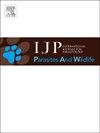Host personality and seasonal parasitism risk do not account for egg rejection behavior in the azure-winged magpie
IF 2
3区 医学
Q3 ECOLOGY
International Journal for Parasitology-Parasites and Wildlife
Pub Date : 2025-03-19
DOI:10.1016/j.ijppaw.2025.101056
引用次数: 0
Abstract
Brood parasitism reduces the reproductive success of hosts and many host birds have evolved a range of anti-parasitism strategies, including egg recognition and egg rejection. Recent studies have shown that host egg rejection behavior can vary according to personality traits and parasitism risk. However, these relationships have not been clearly determined. The aim of this study was to further investigate the influence of seasonal parasitism pressure and host personality traits on egg rejection behavior in the azure-winged magpie (Cyanopica cyanus). Our results showed no significant difference in the proportion of egg rejection between hosts with low (before the arrival of cuckoos) and high (after the arrival of cuckoos) parasitism pressure. In addition, no significant difference was detected in the proportion of egg rejection between bold individuals (shorter flight initiation distance, FID) and shy individuals (longer FID). We hypothesized that the relatively weak effect of the presence or absence of cuckoos on this species could be attributed to their inherently strong egg recognition abilities. Moreover, the quantification of host behavior along a single personality axis (boldness-shyness) may be insufficient to capture behavioral differences that arise from the combined effects of various personality traits. Our study provides novel insights into the influence of seasonal parasitism risk and personality traits on host egg rejection behavior.

寄主个性和季节寄生风险不能解释蓝翅喜鹊的拒卵行为
巢寄生降低了寄主的繁殖成功率,许多寄主鸟类已经进化出一系列的抗寄生策略,包括卵识别和卵排斥。最近的研究表明,宿主排斥卵子的行为会根据个性特征和寄生风险而有所不同。然而,这些关系还没有得到明确的确定。本研究旨在进一步探讨季节寄生压力和寄主人格特征对蓝翅喜鹊拒卵行为的影响。我们的研究结果显示,低寄生压力(杜鹃到达前)和高寄生压力(杜鹃到达后)的寄主排斥卵的比例没有显著差异。此外,大胆个体(飞行起始距离较短)和害羞个体(飞行起始距离较长)的排卵率无显著差异。我们假设杜鹃的存在或不存在对该物种的相对较弱的影响可能归因于它们固有的强大的卵子识别能力。此外,沿着单一人格轴(大胆-害羞)对宿主行为进行量化可能不足以捕捉由各种人格特征的综合影响引起的行为差异。我们的研究为季节性寄生风险和人格特征对宿主卵子排斥行为的影响提供了新的见解。
本文章由计算机程序翻译,如有差异,请以英文原文为准。
求助全文
约1分钟内获得全文
求助全文
来源期刊

International Journal for Parasitology-Parasites and Wildlife
Medicine-Infectious Diseases
CiteScore
3.80
自引率
5.60%
发文量
113
审稿时长
45 days
期刊介绍:
The International Journal for Parasitology: Parasites and Wildlife (IJP-PAW) publishes the results of original research on parasites of all wildlife, invertebrate and vertebrate. This includes free-ranging, wild populations, as well as captive wildlife, semi-domesticated species (e.g. reindeer) and farmed populations of recently domesticated or wild-captured species (e.g. cultured fishes). Articles on all aspects of wildlife parasitology are welcomed including taxonomy, biodiversity and distribution, ecology and epidemiology, population biology and host-parasite relationships. The impact of parasites on the health and conservation of wildlife is seen as an important area covered by the journal especially the potential role of environmental factors, for example climate. Also important to the journal is ''one health'' and the nature of interactions between wildlife, people and domestic animals, including disease emergence and zoonoses.
 求助内容:
求助内容: 应助结果提醒方式:
应助结果提醒方式:


